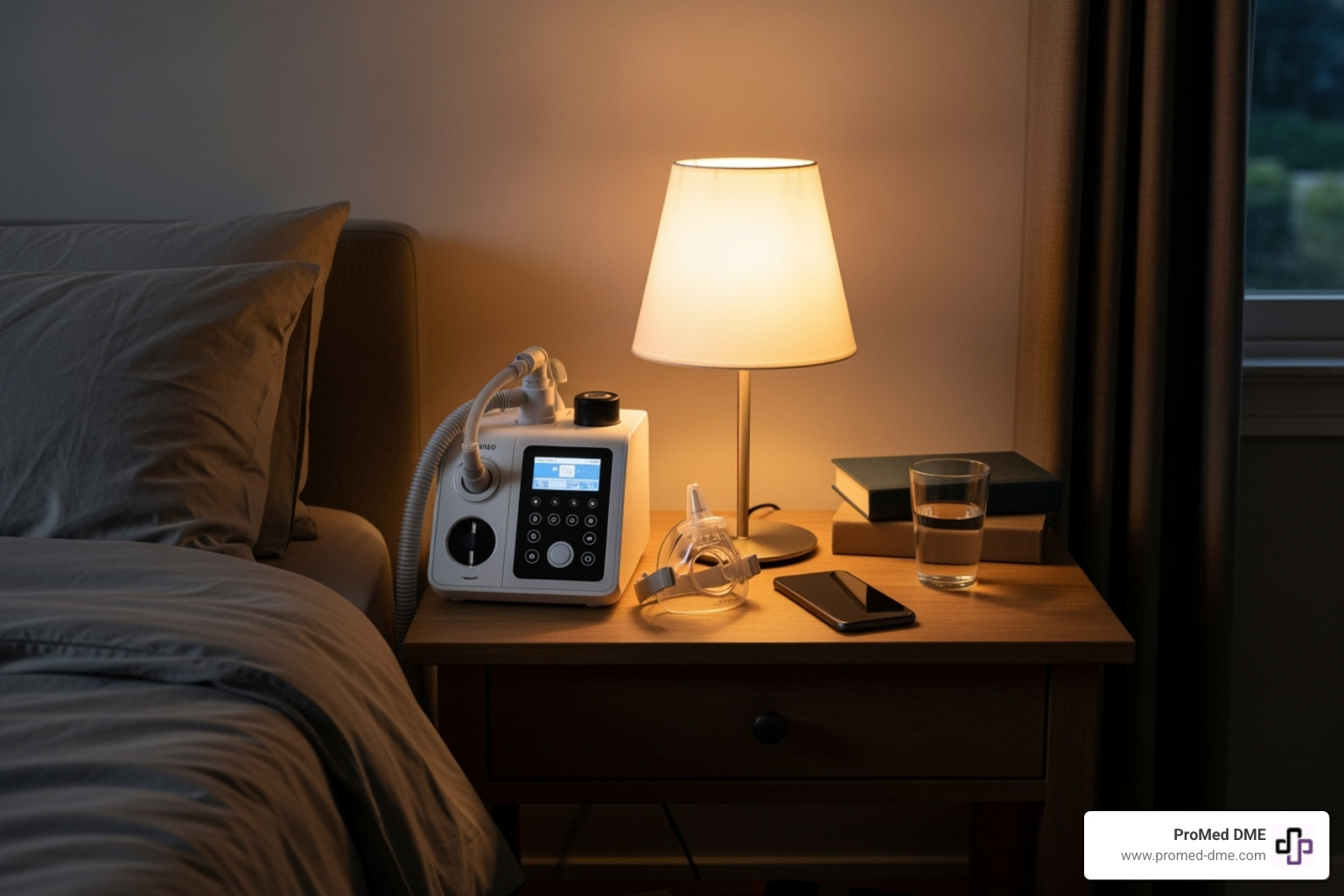Covered or Not? Understanding CPAP Machine Insurance

CPAP machine insurance coverage is a topic many are eager to understand, especially if you've been diagnosed with sleep apnea and seek reliable treatment options. Here's a quick overview:
Insurance usually covers CPAP therapy: If you've been prescribed CPAP therapy for sleep apnea, most insurance plans, including Medicare, help cover the costs.
Diagnosis is key: Coverage typically requires a confirmed sleep apnea diagnosis through a sleep study.
Expect some out-of-pocket costs: You may have to meet a deductible, after which the insurance might cover a significant portion of the expenses.
CPAP therapy is a life-changing treatment for those with obstructive sleep apnea, a condition that disrupts not just sleep but overall well-being. The good news? Many insurance plans see the value in this therapy and offer coverage to help manage costs.
Understanding the landscape of CPAP machine insurance coverage is crucial for managing your health expenses effectively. Let's dive deeper into what this entails and how it can work for you.

What is CPAP Machine Insurance Coverage?
CPAP machine insurance coverage helps make CPAP therapy more affordable for those diagnosed with sleep apnea. This coverage is available through various insurance plans, including private insurance, Medicare, and Medicaid.
CPAP Therapy and Insurance Plans
CPAP therapy is the go-to treatment for sleep apnea. It involves using a CPAP machine to keep your airway open during sleep. This therapy can be costly, but most insurance plans recognize its importance and provide coverage.
Here's how it generally works:
Private Insurance: Most private health insurance plans cover CPAP machines and essential accessories like masks and tubing. However, coverage specifics can vary, so check with your provider.
Medicare: Medicare Part B covers CPAP therapy as durable medical equipment (DME). Once you pay your deductible, Medicare covers 80% of the machine rental and supplies if you meet certain conditions, like having a confirmed diagnosis and adhering to the therapy.
Medicaid: State Medicaid programs typically follow Medicare's guidelines. They cover CPAP therapy for those diagnosed with sleep apnea, provided you meet specific medical criteria and compliance requirements.
Key Points to Remember
Prescription Requirement: Insurance coverage often requires a prescription from your doctor. This prescription confirms that CPAP therapy is medically necessary for your condition.
Diagnosis and Sleep Study: A sleep study is usually required to diagnose sleep apnea officially. This is a critical step, as insurance companies need proof of diagnosis to provide coverage.
Adherence to Therapy: To continue receiving coverage, you need to show that you're using the CPAP machine consistently. This means using it for at least 4 hours per night on 70% of nights. Most modern CPAP devices track usage to help provide this proof.

Understanding these elements of CPAP machine insurance coverage can help you steer the process more smoothly and ensure you get the treatment you need without breaking the bank. Next, we'll explore what insurance typically covers when it comes to CPAP machines and accessories.
How to Qualify for CPAP Machine Insurance Coverage
Qualifying for CPAP machine insurance coverage involves a few key steps. These steps ensure that the therapy is necessary and that you are committed to using it effectively. Let's break it down:
Prescription Requirement
First and foremost, you'll need a prescription from your doctor. This isn't just a formality—it's a crucial step that confirms your need for CPAP therapy. Your doctor will assess your symptoms and decide if a CPAP machine is the right treatment for you.
Sleep Study and Diagnosis
Before you can get that prescription, a sleep study is usually required. This study can be done in a sleep lab or at home. It monitors your sleep patterns to determine if you have sleep apnea and how severe it is. The results of this study are essential for insurance purposes, as they provide official documentation of your diagnosis.
- Sleep Lab Study: Conducted in a controlled environment, providing detailed data.
- Home Sleep Study: More convenient, but still effective for diagnosing sleep apnea.
Adherence Proof
Once you start using the CPAP machine, insurance companies want to ensure you're actually using it. Why? Because adherence to the therapy is key to its effectiveness. To prove adherence:
Usage Tracking: Most modern CPAP machines have built-in tracking systems. They record how often and how long you use the machine each night.
Compliance Requirements: Typically, you need to use the machine for at least 4 hours per night on 70% of nights.
If you meet these requirements, your insurance will likely continue to cover the cost of the machine and necessary supplies.

Understanding these steps can help you qualify for CPAP machine insurance coverage smoothly. With a prescription, a proper diagnosis, and proof of adherence, you'll be on your way to better sleep and health. Next, we'll dive into what insurance typically covers when it comes to CPAP machines and accessories.
What Does CPAP Machine Insurance Typically Cover?
When it comes to CPAP machine insurance coverage, understanding what’s included can make a big difference in your therapy experience and your wallet. Let’s break down the essentials.
CPAP Machines
Insurance usually covers CPAP machines if you have a prescription and a confirmed diagnosis of obstructive sleep apnea. These machines are vital for keeping your airway open during sleep. Most insurance plans, including Medicare and Medicaid, consider CPAP devices as durable medical equipment (DME). This means they usually cover a significant portion of the costs.
Accessories
The machine itself isn’t the only thing you’ll need. Essential accessories are also typically covered:
Masks, Cushions, and Headgear: These are crucial for comfort and effectiveness. They help deliver the pressurized air from the machine to your airway.
Tubing: Connects the mask to the machine. It’s important for maintaining the airflow.
Filters: Keep the air clean by blocking dust and allergens.
Water Tank: Used for humidifiers to add moisture to the air, preventing dryness.
These accessories need regular replacement, and insurance usually follows a replacement schedule to ensure your equipment stays effective.
Rental Period
Often, insurance will start by renting the CPAP machine to you. This rental period usually lasts around 13 months. During this time, you need to demonstrate regular use to prove that the therapy is beneficial. If you meet the adherence requirements, you’ll eventually own the machine at the end of the rental period.
Purchase Options
While renting is common, some insurance plans may offer the option to purchase the machine outright. This depends on your specific policy and needs. Purchasing can be more convenient for long-term users, as it eliminates ongoing rental fees. However, it’s important to weigh this option against potential out-of-pocket costs and your insurance coverage specifics.
Understanding what your insurance covers can help you make informed decisions about your CPAP therapy. Whether it’s renting or purchasing, knowing your options can lead to better sleep and health outcomes. Next, we'll explore the various costs and financial considerations involved in CPAP therapy.
Costs and Financial Considerations
When diving into CPAP machine insurance coverage, it's crucial to understand the financial aspects. Here's a simple breakdown of what you might encounter:
Deductibles
A deductible is the amount you pay out-of-pocket before your insurance starts to cover costs. This can vary widely, from a few hundred dollars to several thousand. For some, meeting a high deductible might mean paying for the entire cost of the CPAP machine and accessories upfront.
Example: If your deductible is $1,000, you must spend this amount on medical expenses before your insurance kicks in.
Coinsurance
After you meet your deductible, coinsurance comes into play. This is the percentage of costs you share with your insurance. For instance, if your plan has a 20% coinsurance, you pay 20% of the CPAP-related expenses, while your insurance covers the remaining 80%.
Example: If your CPAP machine costs $1,000 and your insurance covers 80%, you'll pay $200.
Out-of-Pocket Expenses
These are the total costs you pay on your own, including deductibles, coinsurance, and any copays. Thankfully, most insurance plans have an out-of-pocket maximum. Once you hit this cap, your insurance covers 100% of approved medical costs for the rest of the year.
Example: If your out-of-pocket maximum is $5,000, once you reach this limit, further CPAP expenses are fully covered by insurance.
Financial Planning Tips
Understand Your Plan: Review your insurance policy to know your deductible, coinsurance rates, and out-of-pocket maximum.
Budget for Accessories: CPAP supplies like masks and filters need regular replacement. Factor these into your budget.
Consider Buying Outright: If your deductible is high, purchasing the machine outright might be more economical, especially if you find a competitive price.
Navigating the financial side of CPAP therapy can seem daunting, but understanding these key terms helps you make informed choices. Next, we'll tackle some frequently asked questions about CPAP machine insurance coverage.
Frequently Asked Questions about CPAP Machine Insurance Coverage
Is a CPAP machine covered by insurance?
Yes, most insurance plans, including Medicare, cover CPAP machines. Medicare considers CPAP devices as durable medical equipment (DME) and provides coverage under Part B. However, you generally need to start with a rental period. Medicare usually covers the initial three months of CPAP machine rental. To continue coverage, you and your doctor must show that you're using the machine regularly and that it's improving your symptoms.
How long until you own your CPAP machine?
With Medicare, after renting the CPAP machine for 13 months, you will own it. During this rental period, you pay a portion of the rental cost as coinsurance, typically around 20%. Once the rental period ends, the machine becomes yours, but Medicare will still cover the cost of replacement supplies, as long as you use the device consistently.
Does a CPAP machine require a prescription?
Absolutely. To get a CPAP machine, you need a prescription from a doctor or a sleep specialist. This is a standard requirement across all insurance plans, including Medicare and Medicaid. The prescription typically follows a sleep study that diagnoses you with obstructive sleep apnea. This study can be conducted in a lab or at home. It's a crucial step in ensuring the CPAP machine is properly set to meet your specific needs.
Understanding these basics can help you steer CPAP machine insurance coverage more easily. Up next, we'll explore how ProMed DME can assist you in managing your CPAP therapy and dealing with insurance.
Conclusion
Navigating CPAP machine insurance coverage can feel overwhelming, but you don't have to do it alone. At ProMed DME, we are committed to simplifying this process and ensuring you get the support you need. Our mission is to provide top-quality durable medical equipment (DME) while minimizing your out-of-pocket expenses.
Why Choose ProMed DME?
Our dedicated team, including a nurse on staff, is here to guide you through the insurance maze. We work with most insurance plans, including Medicare and Medicaid, to help you get the coverage you deserve. From understanding your policy to submitting claims, we assist every step of the way.
Exceptional Customer Service
We believe that exceptional customer service is key to a positive experience. Our team is available to answer any questions you have about your CPAP therapy and insurance coverage. We also offer free shipping across the United States, ensuring you receive your equipment promptly and discreetly.
Insurance Assistance
Our goal is to make it easy for you to access and afford the CPAP equipment you need. We assist with insurance paperwork and ensure you understand your coverage options. By working closely with your insurance provider, we aim to reduce your financial burden.
Choosing ProMed DME means choosing a partner dedicated to your health and well-being. For more information on how we can help you with your CPAP needs, visit our ProMed DME service page.
We are here to support you on your journey to better sleep and improved health.
Related Resources & Articles
Stay informed with our informative blog posts.
Discover the ProMed Advantage
& Try Our Products
We offer free shipping and legendary customer service to ensure you receive the
best DME products for your needs.



